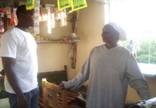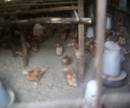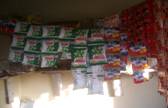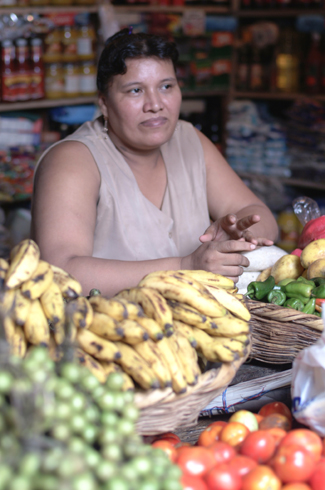MICRO-ENTERPRISE: WE CAN END WORLD HUNGER
Micro-Enterprise Report from Kenya
Introduction
Youth unemployment has become a major challenge in the 21st Century in Sub-Saharan Africa with an estimated 21% of the youth unemployed. This part of Africa will witness a substantial growth in additional labor force of 28 million - 30 Million between 2003 and 2015.
In Kenya, youth employment is a serious development issue where the youth prefer being employed in white collar jobs which are becoming scarce as the population increases and they tend to neglect the agricultural sector where there are many opportunities, especially in the rural areas. A lack of capital to start small businesses is also a challenge to the youths since they do not have collateral like land and hence have a problem accessing financial services. It is estimated that 64% of unemployed persons in Kenya are youth between the ages of 18 and 35.
The youths and women are therefore now turning to small businesses to earn a living. In a bid to encourage the establishment of micro-enterprises by the youths, our project partner has been advancing small loans coupled with basic skills in entrepreneurship which have proved beneficial with tangible impacts. The beneficiaries are able to put food on the table and to meet other family basic needs like school fees, rent, medical bills etc.
Over the last 12 months, many businesses were greatly affected globally by the economic down turn. This, coupled with the prolonged drought that affected most parts of the country, saw overall business activities scaled down. Micro- entrepreneurs who form a high percentage especially amongst the youths and women in Kenya had a rough time. Those who had accessed loans were unable to pay on time, posing challenge to most Micro-Finance Institutions.
The year 2010 began with lots of hope to Kenyans because of increased rainfall during the reporting period led farmers to expect a bumper harvest. Businesses have started to pick up because once food is available and the disposable income increases, people invest in business activities. Inflation also reduced from a high of about 28% in early 2009 to about 5% currently.
Our funded micro-credit program has supported over 100 clients since inception 3 years ago which has had a positive impact amongst the beneficiaries. Every year, more interested entrepreneurs have been approaching us for credit because of the friendly terms, after old clients have spread the word about what we are doing creating an increasing requests to join the program from new clients.
Through experience, we have learned that for a micro-credit program to succeed, training is a critical component. We have been keen on capacity-building of our clients. And it is this capacity-building that has contributed to the low default rates despite the fact that we are not asking for the conventional collateral that most MFI's demand.
The following is a progress report of the activities that took place in the first two quarters 0f 2010.
Summary of activities achieved
| Activity | No. | No. Trained | Remarks | ||||||||||
| Awareness Meetings | 1 | 50 | Old clients were instrumental in creating awareness to their friends and this has contributed to the clientele growth of the program | ||||||||||
| Monitoring visits | 20 | All the entrepreneurs were visited | 90 % of the businesses are operational. Delays in repayments and defaults are being addressed. | ||||||||||
| Field days | 5 |
5 groups were visited
|
Entrepreneurs’ questions and concerns were addressed. |
Training
During the reporting period, training was mainly done at the small group level and covered areas in which members were weak. These included topics like credit management, record keeping, conflict resolution, leadership, and development of business plans.
Handling business finances and separating business from personal finances has not been easy for most entrepreneurs and has affected loan repayments, but after the training, clients began to separate personal from business finances and do exactly what they intended to do with the credit facility. This issue is especially important among the young people that are just starting new businesses.
As money matters are indeed very sensitive and most of our clients cannot raise the collateral required, our requirements demand that potential clients form groups of individuals who know each other and hence can co-guarantee one other to access credit. Conflicts within groups have been experienced but through the trainings, members are learning skills in solving these conflicts and dealing with members that are not paying their credit on time. This kind of education is a form of wealth creation (in terms of character maturity) that will pay dividends for years to come.
The trainings on positive thinking and attitude transformation are making a significant contribution to the positive character in our clients' personalities. Trust, honesty, punctuality, respect, self-control, and responsibility are some of the virtues members are acquiring through the program. They are appreciating the value of individual learning which is enabling them to use the credit they acquire prudently.

An FSK Officer taking potential entrepreneurs at Koimet Quarry through training
Elivier Ojwang
Elivier is a mother of three. Two of her children are at the University while one is in high school. She had been undergoing financial strain since almost all her husband earns goes to the payment of the kid’s school fees. The husband started a poultry project to take care of their family; but maintaining 300 birds was quite challenging for the family. A year ago, Elivier approached us to join the micro-credit program.
In her group of five she managed to get a loan of Kshs. 10,000.00 which she invested in purchasing feed for the birds. The first batch of the flock gave her a profit of Kshs. 20,000 (US$ 267) after eight weeks. She was encouraged and brought in another lot of 300. She managed to raise Kshs. 15,000.00. The sale this time was low due to flooding in the market. Elivier was happy about her business and the boost we gave her family. She has repaid her first loan on time and during this quarter she has taken a second loan of Kshs. 15,000 for a different enterprise (a shop). Her repayments are on schedule and she takes pride in the program. She had this to say in one of the monitoring visits. "My business takes care of the family food budget; therefore my husband has less stress and he can concentrate with the school fees budget."
Monitoring visits
Our micro-enterprise program is quite unique in that we are not only interested in the repayment of the loans but also with the success of the entrepreneurs. Our objective is to see our clientele grow from one level to another. Therefore, there are monthly monitoring visits that are made to every group to assess the progress of the individual entrepreneurs. During these visits, the entrepreneurs share their experiences, challenges and lessons learned and are able to receive coaching and support. The loan officers give advice and respond to the issues raised accordingly. The officer's other mission is to remind the entrepreneurs of their obligation to repay and save as required. Issues on conflicts, development of business plans, leadership are handled within the group training.
To facilitate interaction of the entrepreneurs, workshops bringing several groups together are usually organized.
Credit Disbursement
So far, a total amount of Kshs 2,445,750.00 (about $27,000 US) has been disbursed to 106 individual micro entrepreneurs. Approximately a hundred more people are being prepared to receive credit and have already started to save.
Saving Attitude
The micro credit program is designed to inculcate a saving culture by helping Clients to continue savings even after accessing the loans. This discipline has been embedded in the clients' budget because they have understood the concept. A majority of the clients no longer struggle to save.
Program Impact
The program impact has been very encouraging. Those who have benefited from the program have been able to start up or expand their enterprises. The clients are now able to meet their basic needs like food and school fees. Though they start with small loans, as they grow in business, the clients will be able to cater for their basic needs and have extra to invest in other areas.
The beneficiaries have been empowered through training and information sharing from other members during workshops and as a result they are becoming effective and efficient entrepreneurs. During workshops the clients have been able to create networks which have been very positive in terms of establishing new customers.
Through the weekly savings, members have been able to accumulate amounts of money which otherwise they would not have been able to save. Clients have also learned that there is enough money if they consistently save. Others marvel at what they have been able to do. When they were starting it sounded impossible but now they can confidently say "Yes we can." This is an attitudinal wealth creation.
The program has brought many benefits in the community. Many small businesses have been established while others have been expanded with the resources we have been able to lend. Youth dependency on parents and women on their husbands is being reduced too. Clients are able to take care of their household basic needs food, shelter, health, medical expenses.
Human Interest Stories
Elivier Ojwang
Elivier is a mother of three. Two of her children are at the University while one is in high school. She had been undergoing financial strain since almost all the husband earns goes to the payment of the kid's school fees. The husband started a poultry project to take care of their family; but maintaining 300 birds was quite challenging for the family. A year ago, Elivier approached us to join the micro-credit program.
In her group of five she managed to get a loan of Kshs. 10,000.00 which she invested in purchasing feed for the birds. The first batch of the flock gave her a profit of Kshs. 20,000 (US$ 267) after eight weeks. She was encouraged and brought in another lot of 300. She managed to raise Kshs. 15,000.00. The sale this time was low due to flooding in the market. Elivier was happy about her business and the boost we gave her family. She has repaid her first loan on time and during this quarter, she has taken a second loan of Kshs. 15,000 for a different enterprise (a shop). Her repayments are on schedule and she takes pride in the program. She had this to say in one of the monitoring visits: "My business takes care of the family food budget; therefore, my husband has less stress and he can concentrate with school fees budget."
Elivier is timely in her repayment because she has seen and tasted the benefits of our financial assistance by FSK. Her children are also supportive and when they have closed school, they help their mother in the shop and taking care of the hens. The success of their business is a concern to all family members.
 |
 |
 |
| Elivier and son at their shop | A poultry project | Display of her wares in the shop |
Agnes Wanjiku
Agnes is a young lady aged 25 years. After school, she trained on hairdressing and dreamt of owning her salon. He mother supported her to purchase some of the basic items a salon requires and opened a salon at Kiamunyi near FSK centre. Agnes is very enterprising, unlike many youths. The salon has been running and is the most popular in Kiamunyi. Through the training she has received, she has learned various business skills. She knows how to handle/relate to her customers such that they come back after her good services. She is proud of Farming Systems Kenya.
Her business has grown over time, and she wants to diversify the services she is offering. She took a loan of Kshs. 10,000.00 to start pedicure services. She is very optimistic that one day in her life she will own a hair dressing school.
.jpg)
(Agnes Wanjiku attending to a client at her saloon)
 Since she cannot do everything in her salon, she has employed one person to assist her and is thus providing employment to one youth. She commented, “if 50% of the unemployed youths could access financial services, then all the youths would be busy and this would reduce the criminal activities the youths engage in, due to idleness. I have no time to be idle; I’m always busy in my salon. I’m grateful for partners like Children’s Hunger Relief Fund and FSK."
Since she cannot do everything in her salon, she has employed one person to assist her and is thus providing employment to one youth. She commented, “if 50% of the unemployed youths could access financial services, then all the youths would be busy and this would reduce the criminal activities the youths engage in, due to idleness. I have no time to be idle; I’m always busy in my salon. I’m grateful for partners like Children’s Hunger Relief Fund and FSK."
Help us end world poverty, despair and war
Poverty causes disease, despair and death.
It also causes war. When people have no job and no hope, they are more likely to join in violent conflict to take what they can’t create.
When people are self-sufficient enough to provide for their family’s needs, there is no need for conflict.
Our vision for world peace:
Break the self-perpetuating cycle of poverty and conflict by providing deserving families an opportunity of self-sufficiency through a $250 small business loan.
Thousands of families then create more jobs, as well as providing new goods and services, like food and clothing, for the community.
Families pay the loan back which then goes on to help another family.
Create hundreds of family businesses every year!
Now we can do it for just $250 per family
Nakuru: Micro-Enterprises
Report from Nakuru, Kenya
The first day was spent driving around visiting people that have received some of our micro-enterprise loans.
We wanted to hear and see first hand what these loans have helped these people to achieve.
The very first person we visited was Elizabeth Nyambura, who, as it turns out, is probably going to be our Poster Person for what can happen when you get capital into the hands of people, train them, and offer ongoing advice and council.
Well, in Elizabeth’s case, she is the one now giving advice and counsel throughout her small village outside of Nakuru.
With her first loan, Elizabeth purchased a cow. It was obviously a "Cash Cow," because, with the profits from the milk she sold, she managed to support her children, construct a water tank, complete with piping from a water source up the hill 2.5 miles behind her house, No, she didn’t hire anyone to lay down the pipe: she did it herself, with the help of her 10 children. Elizabeth is a widow.
Not long after doing this, Farming Systems Kenya, who oversees our mirco-enterprise program in this area, chose Elizabeth to be part of its dairy-goat program.
With this goat, she was able to sell 7 kids (baby goats, not children), thereby paying for a daughter and son’s education, constructed an iron sheet roof for her kitchen (replacing the grass thatched one), and bought another goat and 2 kids. Her flock is now at 18 goats. The milk from these goats supports her family, and especially, the ongoing fees for educating her children.
Oh, did I mention that she also has 30 acres of corn and sells honey from her beehives?
As you can see, the corn is parched from the draught the nation is experiencing. Amazingly, Elizabeth smiles and simply looks around for other avenues for generating cash.
Next up, Elizabeth Wangui Ng’ang’a here with her husband and daughter Elizabeth owns the local hair salon.
Given the severe drought that Kenya is suffering, her business now barely provides for her family’s monthly needs.
She applied for a loan, from which she began purchasing indigenous chickens, which brings higher profits from eggs and meat than exotic chickens.
From a loan of just over $200 she purchased 30 chickens, and has a goal of 70 more.
Being a forward-thinking person, she used part of the loan to erect a fence for her chickens, so as to deter any temptation of thievery, and to better control what the birds eat.
Always on the lookout for new ways to generate income, Elizabeth charges around ten cents per charge. While most of the people in her village have cell phones, few have electricity.
John Kiiru was off purchasing fodder for his cow, and I took this photo, of his wife, expecting to take one of him, later. When we finally sat down with him, I became so enthralled with his passion for dairy farming and being an example to the members of his church (John is the pastor of a local church), I forgot to take a photo.
John was in our training last year and couldn’t thank Davide and me enough for how the “attitude transformation” jettisoned him toward the success he is now experiencing.
Having $250, John attained a loan for $800 so that he could purchase a Holstein. Within a month this beauty calved down and, with selling around 20 liters of milk per day, he was able to pay off his loan with ease, while providing for his family.
He is now in the process of receiving another loan to purchase his next Holstein.
Anthony Maina Gethi. Anthony was off generating income elsewhere, so his wife was tending the store.
With a loan of around $500, Anthony expanded his stock, which enabled him to provide for his family and pay off the loan (he only has two more payments), in spite of the severe economic conditions in Kenya.
Anthony says that through our training on transforming mindsets regarding possibilities and opportunities for success, as well as how to create rapport with customers, he his been able to attain and maintain a loyal customer base.
Two of Anthony’s friends, Dickson Mwangi and Ibrahim Ndungo, witnessed his success, received micro-loans and started their own grocery stores close by.
Within a short time, other people also started businesses through micro-loans, and, Voila, we now have a strip mall!
One of the encouraging things about this trip is seeing the tangible results of our trainings.
Poverty is a mindset just as self-sufficiency is a different mindset.
Copyright, Monte E Wilson
Dairy goat gives hope to a young mother
Susan Nyambura, a single mother of two can see some light at the end of the tunnel. Her husband died two years ago.
For many years she bought milk to support her young children with a lot of struggle. She is suffering from HIV/AIDS and this had confounded her perils. Hope came in when she heard of a program that provided support to communities for micro-enterprises. She joined Msamaria Mwema SHG (“Msamaria mwema” means Good Samaritan) in a bid to pool resources together and improve their livelihoods.
Her persistence and seriousness in the group led her to get a leadership position in the group and was nominated by the group for Transformation Training that was organized by CHRF in March 2008. During the transformation training, her perception in life changed and took a more business-oriented approach. She started a salon in her neighborhood, which keeps her busy most of the time. The little proceeds are used to meet the family expenses.
In the month of May 2008, she was among the members who received dairy goats in an exciting ceremony. She was lucky to receive a lactating doe. Upon receiving it, she started milking the goat, receiving 2 liters every day, which is sufficient for her families needs. She no longer spends Kshs. 600.00 (US $ 11.00) every month to buy milk, and can now be used for other family needs. Susan comments “Dairy goat milk is indeed much more nutritious than the cows milk was. My health has drastically improved, as has the health of my children. We are no longer vulnerable to opportunistic diseases and I have the strength to carry on my daily chores with not much help from my other family members.
Her last born child is in standard three at Renuko Primary School. “... once my little boy reaches fourth class next year, I will take him to a boarding private school called Joswin Academy when I sell the offspring next year,” she says with a smile and hope. She also has the responsibility of her two grandchildren. Besides, the milk and the anticipated sale of offspring, she uses the manure from the flock to improve the soil in her kitchen garden that produces indigenous vegetables. She says that the benefits of a goat are enormous. The goat takes less space, requires less feed, and produces offspring much sooner. Her neighbors are envious. They keep asking how she manages to keep her health all the time when others are struggling. She advises them to take keen interest in the animal and to apply the training received in order to properly manage the enterprises.
She looks at the future with a broad smile and she is very grateful to God for thinking about her.
Thanks to CHRF and may God bless them so much.


